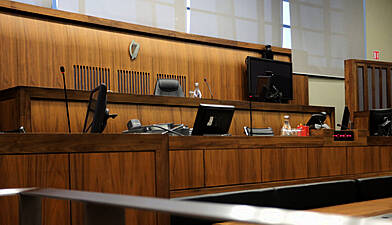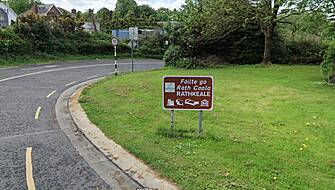A jury at the Central Criminal Court have begun their deliberations in the trial of a Polish man charged with murdering a 24-year-old Mayo man by stabbing him in the stomach with a knife.
In delivering her charge to the jury on Wednesday, Ms Justice Mary Ellen Ring told them that there were five possible verdicts open to them in the case of Matusz Batiuk (33), formerly of Carrabeg Estate, Swinford, Co Mayo.
The accused has pleaded not guilty to the murder of Michael McDonagh at the housing estate on November 16th, 2020, and the jury previously heard that the accused said he believed his life was in danger when he stabbed Mr McDonagh.
The judge said the jury could either find him guilty of murder; not guilty of murder on the grounds of self-defence; guilty of manslaughter by reason of self-defence but the use of excessive force; guilty of manslaughter if they considered he did not intend to kill Mr McDonagh, but that he assaulted him in a manner that led to his death; or guilty of manslaughter on the grounds of diminished responsibility.
Ms Justice Ring reminded the jury of the evidence in the case. She said that when gardaí arrived at the home of Mr Batiuk, they discovered Paul Maughan, of Newpark, Swinford, covered in blood with lacerations to his thumbs, and Mr McDonagh on the ground in the kitchen with a serious amount of blood around him.
Mr Batiuk, who had a knife in his hand, told gardaí: “I stabbed him in self-defence."
Ms Justice Ring said Mr Maughan gave evidence during the trial that he could not open a bottle of wine at Mr Batiuk’s house, and while attempting to open the bottle, suffered the injury to his hands.
Mr Maughan also gave evidence that he knew Mr McDonagh had a carpet knife with him at the time of the incident.
Mr Maughan told the trial that he went to the bathroom to wash the blood off his hands, adding he did not see Mr Batiuk stab Mr McDonagh.
Inaccuracies
The judge reminded the jury that the defence had put it to Mr Maughan that there were inaccuracies in his evidence.
She said Mr Maughan had denied that an angry conversation took place between him and Mr Batiuk concerning an accusation that Mr Batiuk had been sleeping with Mr Maughan’s sister.
He also denied that Mr McDonagh said to Mr Maughan: "If you want me, I will hurt him", and denied telling Mr McDonagh to hurt the accused.
The judge said Mr Maughan gave evidence that he did not see Mr Batiuk pick up the knife, nor did he see Mr McDonagh move towards Mr Batiuk.
He also said that he did not know how Mr McDonagh’s knife ended up on the floor, nor did he remember Mr McDonagh showing him the knife and saying: “Look at this, I have it for somebody.”
The judge noted, in his direct evidence during the trial, Mr Maughan said he had lied in his original statement to gardaí, in which he said Mr Batiuk “went for” Mr McDonagh, and Mr Maughan tried to protect himself by pushing the accused away, which was how he sustained the cuts to his thumbs.
She also reminded the jury that Mr Maughan confirmed he is currently serving a sentence for stabbing Mr Batiuk three months before the death of Mr McDonagh.
“You have to decide about his evidence. He came to court and took an oath to tell the truth, and you can accept or reject everything he said. You decide what of his evidence, if any, you can rely upon,” Ms Justice Ring told the jury.
Stab wound
She told them pathologist Dr Kathleen Han Suyin gave evidence that Mr McDonagh died as a result of one stab wound that transected his right common iliac artery.
Dr Han Suyin said it was “unfortunate” that the knife hit the artery and it was difficult to be accurate as to the force required. The pathologist said that the person could walk into the knife, or force could have been used.
Ms Justice Ring said there had been “a fair amount of agreement” between two forensic psychiatrists in the case, and Mr Batiuk was “clearly a man who for over a decade and half suffered with schizophrenia”, a mental illness that comes within the legal framework.
She reminded the jury that neither medical witness was satisfied that this put the accused in the category of someone who was insane with regards to his actions.
"You have to look at what his intention was at the time when he admittedly stabbed Mr McDonagh," the judge stressed,
She added that at the closing of the case, prosecution counsel Desmond Dockery SC said this was an unlawful killing and the accused was guilty of murder.
What lethal threat
She said the prosecution asked what lethal threat Mr McDonagh had posed to Mr Batiuk, adding the prosecution pointed out there were no injuries to Mr Batiuk, so the only injury was to Mr McDonagh.
Ms Justice Ring said defence counsel Vincent Heneghan SC said this was a clear case of self-defence and the State had not disproved that the accused was acting reasonably in defending himself.
The judge added that Mr Batiuk accepted that he stabbed a man, but he made it clear from the outset that he was acting in self-defence.
The judge reiterated the verdicts available to the jury. If they were satisfied that Mr Batiuk had the intention to kill or cause serious injury, and it was proved beyond reasonable doubt that it was not self-defence, the verdict would be guilty of murder.
She said the verdict would be not guilty of murder if the prosecution failed to prove the accused was not acting in self-defence and the jury felt he honestly believed it was self-defence and the level of force was reasonable.

Ms Justice Ring said the verdict should be not guilty of murder but guilty of manslaughter if the jury felt it was not proved that Mr Batiuk was not acting in self-defence, and he subjectively believed that it was necessary to use force, but the force was not objectively reasonable and was excessive.
She said the verdict should be guilty of manslaughter if the jury were not satisfied that the intention to kill or cause serious injury was there, but he assaulted Mr McDonagh in a manner that led to his death.
The final verdict the jury could consider, the judge said, was not guilty of murder but guilty of manslaughter on the grounds of diminished responsibility.
The jury of nine men and three women will continue their deliberations on Thursday.







